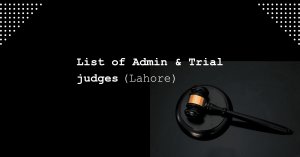Menu
Here’s a summary and key points regarding amendment in plaint under the CPC:
1. General Power to Amend Pleadings:
Order VI, Rule 17 of the CPC gives the court the discretion to allow amendments to the plaint, written statements, or any other pleadings at any stage of the proceedings, even after the trial has started, if necessary and in the interests of justice.
When can the amendment be made?
An amendment can be allowed at any time before the judgment is passed, provided it is required to correct any defect or error in the pleadings or to clarify or complete the matter.
The amendment should not cause injustice to the other party.
2. Grounds for Amendment:
A party can request an amendment in the plaint for reasons such as:
Correcting a clerical or typographical error in the plaint.
Adding new facts that have come to light after the filing of the plaint.
Changing the legal grounds or adding a new cause of action.
To include any material facts that were previously omitted.
To reflect the true nature of the relief sought or the prayer clause.
3. Procedure for Amendment:
A formal application must be filed with the court requesting the amendment, which should specify the nature of the amendment and the reasons for the amendment.
The application for amendment may be made with or without notice to the opposing party. However, notice is typically given unless the amendment is minor.
The court will consider whether the amendment will change the nature of the case or if it will prejudice the other party.
The court may set a time frame within which the amendment should be made and also impose conditions (e.g., costs).
4. Conditions for Granting Amendment:
The court’s discretion in granting the amendment is wide, but it must be exercised judiciously, considering the following:
The amendment should not introduce a new case or cause undue delay in proceedings.
The amendment must not be intended to mislead the court or the other party.
The amendment should be necessary to determine the real issue in controversy.
The opposing party should not be prejudiced by the amendment (unless the prejudice can be remedied by costs or another order).
5. The Effect of an Amendment:
Once granted, the amended plaint will take the place of the original plaint.
The court may allow the opposing party to file a fresh written statement or to respond to the amended plaint if necessary.
In certain cases, the court may require the plaintiff to pay costs for the delay caused by the amendment, but it cannot reject an amendment solely because it might cause delay.




